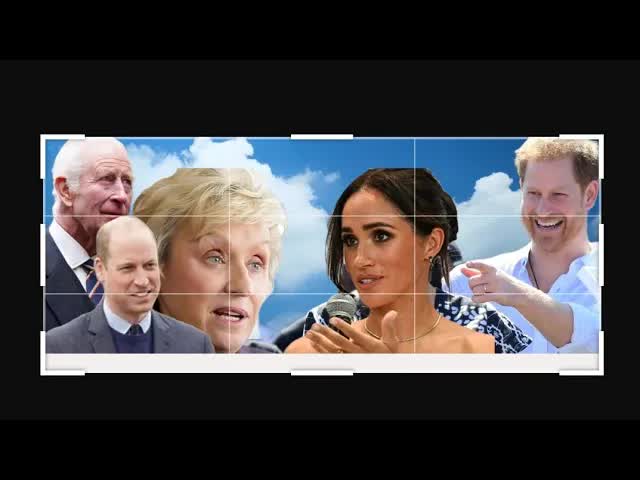The British royal family is currently embroiled in a dramatic saga that highlights a troubling trend of institutional narcissism.
At the heart of this turmoil is a stark inability to embrace the choices made by Prince Harry and Meghan Markle.
Instead of being treated as beloved family members, they are viewed more like corporate assets, subject to manipulation and control.
This dysfunctional dynamic reveals a monarchy that prioritizes conformity over familial love and individual freedom.
The royal family’s reaction to Harry and Meghan’s decision to step back from royal duties speaks volumes about their entrenched expectations.
Their collective response, which has ranged from passive-aggressive media leaks to overt public criticism, showcases a toxic environment where personal agency is seen as an act of betrayal.
Rather than supporting their own family members, the monarchy appears more interested in preserving a polished public image, leaving little room for genuine compassion or understanding.
This desperate need for control within the House of Windsor has become glaringly evident.
The royal family’s inclination to micromanage Harry and Meghan reflects a deeply rooted dysfunction.
Autonomy is perceived as a threat, and the Sussexes’ repeated assertions of independence seem to baffle the institution, which has long expected unquestioning loyalty.
For Harry and Meghan, breaking free from these archaic structures is not merely a personal choice; it’s a revolutionary act that challenges the very foundations of royal tradition.
The rift between Prince William and his brother Harry further underscores the monarchy’s internal struggles.
William’s resentment toward Harry stems not only from revelations in Harry’s memoir but also from a fundamental misunderstanding of Harry’s quest for autonomy.
The royal family’s shock at the Sussexes’ departure highlights a mindset that prioritizes institutional narratives over individual identities.
This rigid perspective fails to recognize that Harry’s choices represent a reclamation of personal dignity rather than a rejection of familial ties.
King Charles faces a critical dilemma as he navigates the monarchy’s future without Harry’s unique contributions.
The absence of Harry’s empathetic approach, especially towards veterans and marginalized communities, leaves a noticeable void in the royal family’s public persona.
While William may speak of empathy, Harry has consistently demonstrated it through his actions, particularly with initiatives like the Invictus Games.
It’s ironic that the very family that distanced itself from him now realizes the impact of his absence.
William’s reluctance to adapt to a more modern royal approach reveals the underlying dysfunction within the monarchy.
By resisting the idea of delegating diplomatic responsibilities to Harry, who possesses a genuine international appeal, the royal family risks missing out on opportunities to connect with diverse audiences.
The Sussexes could serve as vital ambassadors, especially in Commonwealth nations, yet their potential remains untapped due to outdated expectations.
Meghan Markle’s harrowing experience within the royal institution starkly contrasts her current life in Montecito, where she thrives as a businesswoman and mother.
Once nearly crushed by the weight of royal expectations, she has transformed her narrative into one of empowerment, showcasing her worth beyond the confines of traditional roles.
The monarchy’s attempts to control her only fueled her determination to redefine success on her own terms.
The British monarchy stands at a crossroads, grappling with its relevance in a rapidly evolving world.
Harry’s departure should be seen as a chance for regeneration rather than a betrayal.
It offers an opportunity for the institution to embrace a more inclusive and progressive identity, one that resonates with contemporary values.
Commentators like Tina Brown have highlighted the irony of a monarchy that claims to modernize while still clinging to outdated power structures.
The royal family’s ongoing struggle to manage the narrative surrounding Harry and Meghan illustrates a profound disconnect from the realities of modern society.
Their insistence on forcing Harry and Meghan into predefined roles reflects an unwillingness to adapt to generational changes.
An institution that prides itself on continuity seems paralyzed by the very dynamism that could ensure its survival, choosing instead to marginalize those who challenge its antiquated protocols.
Harry’s experiences, from military service to founding the Invictus Games, demonstrate the kind of compassionate engagement that could revitalize the monarchy.
Yet, he remains sidelined, a clear indication of the family’s failure to recognize transformative potential when it exists within their own ranks.
The persistent attempts to control the Sussexes reveal an institution desperate to maintain its outdated systems, overlooking the fact that modern royalty requires genuine adaptation.
The royal family’s shock at the Sussexes’ independence underscores a significant misunderstanding of evolving societal norms.
Harry and Meghan represent a new model of public service that transcends the limitations of traditional royal expectations.
Their decision to forge their own path is not a betrayal; it is a necessary evolution.
The survival of the monarchy hinges on its ability to embrace the transformative potential that Harry and Meghan embody.
Ultimately, the royal family must come to terms with the reality that Harry’s future lies in his own definition of purpose, not in the confines of their predetermined expectations.
It’s time for the Windsors to allow Harry and Meghan the space to thrive independently, recognizing that their choices can contribute to a broader narrative of modern royalty that is more relatable and relevant to today’s world.
